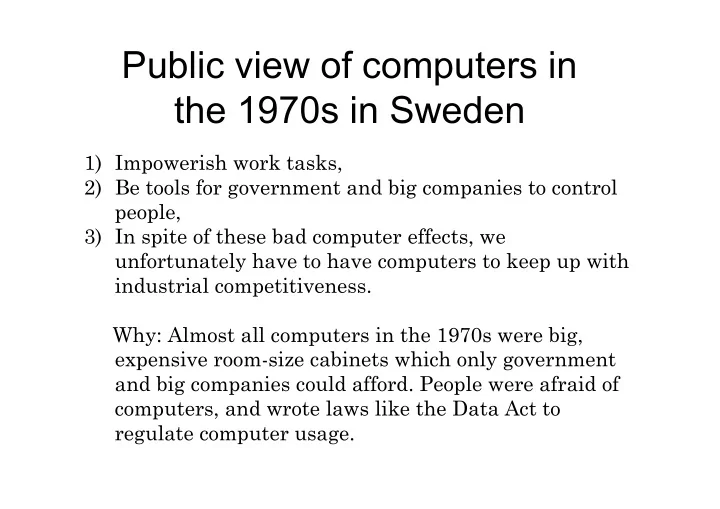

Public view of computers in the 1970s in Sweden 1) Impowerish work tasks, 2) Be tools for government and big companies to control people, 3) In spite of these bad computer effects, we unfortunately have to have computers to keep up with industrial competitiveness. Why: Almost all computers in the 1970s were big, expensive room-size cabinets which only government and big companies could afford. People were afraid of computers, and wrote laws like the Data Act to regulate computer usage.
A few people thought otherwise • Murray Turoff and Roxanne Hiltz visited Sweden and told us: A computer is like a book with unlimited number of pages, where anyone can write anything they want on any page, and any other person can read it. • Today, this is obvious to anyone. But at that time, our ideas were new and not very much accepted. • A few people, myself (Jacob Palme), Tomas Ohlin and Torgny Tholerus listened to Murray and were captivated by his ideas.
We wrote articles and papers like • “The general democratic information system” • “All information for everyone” • “The general public encylopedia”
People did not listen, did not comprehend • But I succeded in getting FOA to buy one of the world’s first time-sharing machine, PDP-10, where many people could connect and run programs on a shared computer. • Tomas Ohlin, who worked at Nutek, got financing to get one of the world’s first forum systems installed on FOA’s PDP-10. • The Swedish government decided to outlocalize FOA to five different cities around Sweden. • I got FOA to develop a more powerful forum system, the KOM system. • Hundreds of people could join KOM, connect to the many discussion groups within the KOM system. Then in 1978 disaster struck!
Then disaster struck; Background The Swedish Data Act: • All information about a person is “personal information”. • All personal information is stored in files. • Files consist of fields. • For every field there is a description of what is allowed in that field, such as “age” or “wage” or “Surname”. • For every field, you have to have permission from the Data Inspection Board on what is allowed in that field.
Then disaster struck! • The Swedish Data Inspection Board decided that since KOM stored informaton about people, it consisted of personal files. • And since KOM allowed anyone to write anything they wanted, even such forbidden things, according to the Swedish data act, as political and religious opinions, we were forbidden according to the Swedish Data Act. • We were forced to shut down the KOM system!
Months of negotiations followed, finally we got permission to restart KOM, provided that: • No discussions about politics or religion. • No discussions about medical or sexual issues. • All messages were to be deleted after two years. • Personal e-mail were to be deleted after one month.
We started KOM again • And we actually had discussions about politics and religion and the Data Inspection Board did not find out. • I archived the discussions, against the rule that everything had to be deleted after two years. • Some of our discussions are still avaiable now on the Internet, see • http://people.dsv.su.se/jpalme/qzkom/
Swedish parliament • When a revised version of the Swedish Data Act was to be adopted by the Swedish parliament in 1982, I wrote a bill, which was submitted to the parliament by a friend of me, Olle Wästberg, who was at that time a member of the Swedish parliament. This bill said that the Data Act should not be permitted to be used to suppress freedom of speech. • This bill was promptly rejected by the Swedish parliament. It was impossible to get politicians understand that computers was important for freedom of speech.
Recommend
More recommend